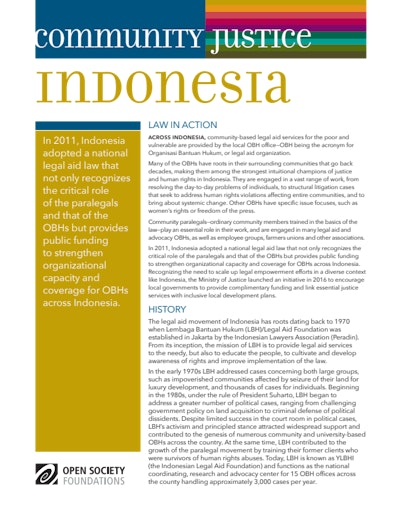The United Nations 2030 Agenda for Sustainable Development calls on governments to ensure equal access to justice for all—recognizing that justice is essential for inclusive development.
But how can we ensure that everyone—regardless of wealth or social status—can get access to the protection of the law?
As part of the global effort to support the implementation of Goal 16 of the 2030 Agenda (building peaceful and inclusive societies), the Open Society Foundations are supporting efforts to institutionalize nationwide community-based justice services in 11 countries: Indonesia, Kenya, Macedonia, Moldova, Mongolia, Nepal, Pakistan, Sierra Leone, South Africa, Ukraine, and the United States.
This series of fact sheets provides basic information on a range of different approaches to the provision of primary legal services around the world.
The approaches vary, but the aim is the same: to ensure that everyone can use the law themselves to find concrete solutions to their day-to-day justice problems.
Download
-
Community Justice: Indonesia (82.81 Kb pdf file)
Download the two-page document.
-
Community Justice: Ontario (81.77 Kb pdf file)
Download the two-page document.
-
Community Justice: Sierra Leone (81.19 Kb pdf file)
Download the two-page document.
-
Community Justice: Moldova (68.8 Kb pdf file)
Download the one-page document.
-
Community Justice: South Africa (82.49 Kb pdf file)
Download the two-page document.
-
Community Justice: Ukraine (68.36 Kb pdf file)
Download the two-page document.
